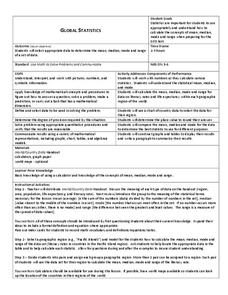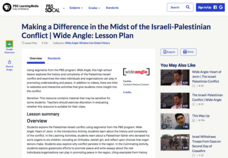Curated OER
Ethical Consumer Choices in the Global Village
Students identify an issue and provide several reasons to support a position. They describe ways members of a community meet one another's needs. Students explain their roles, rights, and responsibilities within the community.
Curated OER
Global Water
Students collect data on their household water use and calculate how many gallons of water a person uses per day. They investigate how students in different parts of the world get their drinking water.
Curated OER
Debt: Who Does it Affect?
Debt is a topic that affects everybody: the community, the nation, and the entire globe. Kids take charge of debt by designing a project that informs those in their community about good financial choices, keeps personal debt low, and...
Curated OER
English Learner Types - Quiz Lesson
An interesting quiz awaits your English Language Learners. In it, they answer ten questions pertaining to why they are learning English, and how they think they can best learn the language. Some thought-provoking discussion should ensue...
Curated OER
Global Resources: What Will You Do with Your Power?
Learners examine the human impact on natural resources. They read and discuss an article, evaluate nations regarding their environmental problem-solving, develop a presidential speech on the environment, and conduct a natural resources...
Curated OER
Global Statistics
Students determine statistics based on data. In this statistics lesson, students use data and record in charts. Students create graphs based on the statistics found.
Curated OER
World Oil Reserves: Assignment
Understanding and analyzing data is a critical skill. Included here are three worksheets a list of countries with the largest oil reserves, a graph of the same, and an assignment. The class uses their data to create a bar chart then...
Curated OER
Lesson: Tlatelolco: Mexican Student Massacre 1968
The Massacre of Tlatelolco is the focus of a discussion-based lesson. Civil-minded learners consider the nature of student movements that have ended in violence based on over-reaction and government oppression. They discuss the social...
Curated OER
Trade Spreads Indian Religions and Culture
India's religion and cultural practices spread as trade and desire for their resources increased. Examine the shifts in Buddhism, Hinduism, and regional cultures that came with the spread of Indian trade. This presentation could be an...
Learning to Give
Five Thousand Dollars!
How does consumerism affect global poverty? Upper graders find out about cost benefit, wants and needs, and making good consumer choices as they explore this global topic. They role-play an impulse spending experience and work through...
PBS
Making a Difference in the Midst of the Israeli-Palestinian Conflict
What can individuals do to give peace a chance in the Middle East? Through a series of activities including viewing segments from a PBS video, class members learn about the complex history of the conflict and about efforts to promote...
Just Health Action
Whose Backyard? Toxic Waste Management Meeting and Environmental Injustice
Toxic waste is a global problem. What to do with environmental hazards and where to put toxic waste is a global concern. To better understand current issues around toxic waste management and how current practices can lead to...
NASA
Future Temperature Projections
No one knows what the future will bring, but it's likely to be warmer than before. Pupils first learn about the NASA GISS ModelE2, a global climate model, and about representative concentration pathways that estimate the global output of...
DocsTeach
Cultural Diplomacy and the Smith-Mundt Act
During the Cold War, the United States used everything from bookmobiles to radio stations to improve its image globally. Using documents from the programs, including photographs and official memos, individuals consider how the United...
National Wildlife Federation
Quantifying Land Changes Over Time in Areas of Deforestation and Urbanization
Is qualitative or quantitative research more convincing when it comes to climate change? In the eighth lesson during this 21-part series, scholars begin by performing a quantitative analysis of deforestation and urbanization. Then, they...
Teach Engineering
Introduction to Environmental Engineering
A series on environmental engineering introduces the class to issues that environmental engineers work to solve. This first activity focuses on air and land issues, and looks at ways to reduce pollution.
National Endowment for the Humanities
How to Win a World War
High schoolers are have begun to learn the art of diplomacy with each other, but do they understand how diplomacy works at a global level? The second in a series of four lessons, guides scholars in evaluating primary sources. The why...
Carolina K-12
The End of World War II: Pearl Harbor, Japanese Internment Camps, and the Atomic Bomb
The end of World War II saw major events that would forever change the global landscape and international relations. Using a fantastic PowerPoint presentation and several primary source documents, your learners will discuss the bombing...
Curated OER
How Will We Create a Future without Waste?
Many young people act globally by reducing, reusing, and recycling, Now they take it to the next level by upcycling. Middle schoolers design a proposal to eliminate waste by exploring the new material cycle and applying their knowledge...
American Press Institute
Media Literacy: Where News Comes From
What actually happens at a press conference? Make sense of the mayhem with a mock press conference activity designed to promote media literacy. Individuals participate as either members of the press or the governor's office to examine...
US Institute of Peace
Maintaining Trusting Relationships
What role does trust play in diffusing a tense situation? Young social scientists explore trust on a personal and global level during a lesson on peace and conflict. After participating in a trust sit, participants work in groups to...
Howard Hughes Medical Institute
Measuring Obesity
Studies show that obesity is now a global problem. But how are researchers measuring obesity? Young scientists investigate the myriad of methods for measuring body fat through a presentation. From hands-on to high-tech, viewers learn...
Kenan Fellows
Electricity: Sources, Usage, Challenges, and the Future
What does the future of energy look like? Junior engineers collaborate to discover a solution to the global energy crisis during a very hands-on instructional activity. The unit focuses on learning through collaboration to develop a deep...
National History Day
Why Did the United States Enter World War I in 1917?
World War I was the first major conflict on a global scale. Using primary documents, learners determine why the United States chose to enter World War I when it did. After analytical writing and group research, the causes of America's...
Other popular searches
- Global Warming
- Global Climate Change
- Global Education
- Global Awareness
- Global Cultures
- Global Economics
- Global Issues
- Global Ecology
- Global Warming Worksheet
- Global History
- World Population
- Global Wind

























